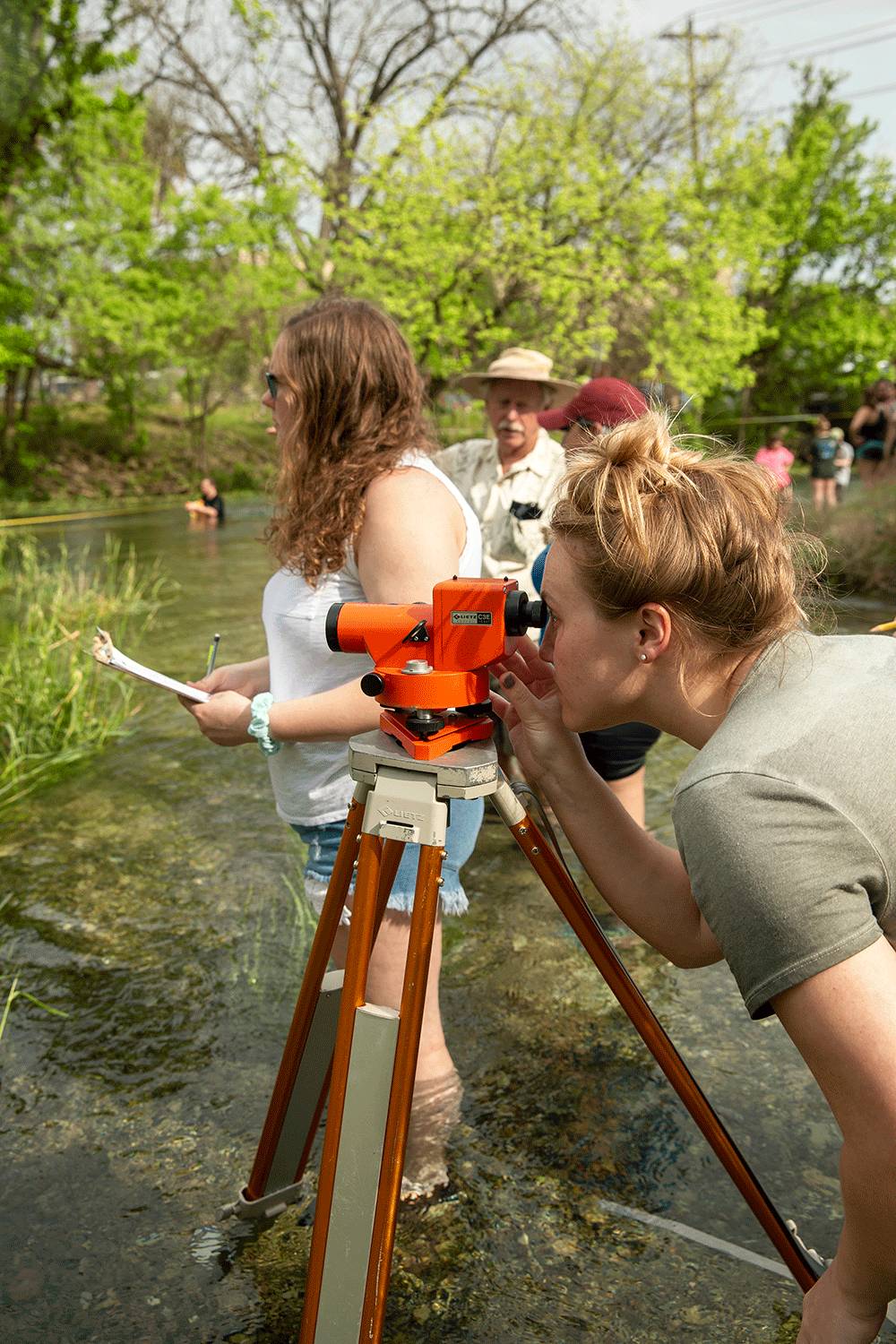Geography (M.A.Geo./M.S.)
MAGeo/MS Geography (Master's)

Program Overview
Working closely with a dedicated faculty that is recognized nationally and internationally for its research, mentoring and teaching accomplishments, students embark on a journey of professional development that includes research and teaching opportunities. The department also hosts or plays key roles in several international, national and university-wide research centers.
Course Work
The M.S. program offers a flexible graduate degree plan and supports students interested in developing publishable research. Students complete 30 credit hours, including core, skills and elective courses, as well as six hours of thesis work. A research thesis is required to complete the degree.
The M.A.Geo. program offers topically focused graduate degree plans emphasizing skills in applied research and analysis in natural resource management, environmental planning, geographic information science, urban and community planning, and geographic education. Students complete 33 credit hours, including core and skills courses. A research paper is required to complete the degree. Online courses are available in all M.A.Geo degree plans, and students can take 50-100% of their coursework online.
| Degree | Concentration | Hours | Thesis Option | Minor Option | Location |
|---|---|---|---|---|---|
Degree M.S. | Concentration No concentration | Hours 30 | Thesis Option Thesis | Minor Option No minor | Location San Marcos |
Degree M.A.Geo | Concentration No concentration | Hours 33 | Thesis Option Non-Thesis | Minor Option No minor | Location San Marcos/Online |
Degree M.A.Geo | Concentration Geographic Education | Hours 33 | Thesis Option Non-Thesis | Minor Option No minor | Location Online |
Online Availability
This following concentrations are offered completely online:
- No Concentration (Non-Thesis)
- Geographic Education
If you are not a Texas resident and will not relocate, please visit the Office of Online and Extended Programs. International applicants will not be eligible to receive a Form I-20 or DS-2019 for an F-1 or J-1 visa from Texas State and may review the eligibility requirements of enrolling in online programs and contact the International Student and Scholar Services (ISSS) with questions.
Program Details
Our master's students have been recognized with research awards and academic scholarships at the international, national and regional levels, and have pursued professional careers or joined doctoral programs at Texas State and elsewhere.
Program Mission
The mission of the Department of Geography is to offer students educational experiences of the highest quality and to conduct meaningful and vital research. The department is committed to outstanding teaching and scholarly activities within the framework of academic freedom and the diversity of ideas and is dedicated to the advancement of knowledge and to public service. The department stresses the theoretical and applied realms of geography in all of its curriculum, leads the discipline with innovative applied work, and actively seeks to recruit top students nationally and internationally.
Related Programs: M.A.Geo in Geographic Information Science | M.A.Geo in Geography Resource & Environmental Science
Career Options
M.A.Geo. graduates typically pursue professional careers in environmental management, GIScience, physical and environmental geography, and planning. M.S. graduates typically continue their studies at the doctoral level or apply for research-oriented positions in the public or private sector. M.A.Geo. and M.S. alumni work in the private or public sector, in federal agencies or research centers, or have continued to the Ph.D. level.
Program Faculty
Full-time faculty members conduct research in physical, human, and environmental geography, geographic education, and geographic information sciences, and publish in top-tier journals, including the Annals of the American Association of Geographers, The Professional Geographer, Urban Geography, Physical Geography, the International Journal of Geographical Information Sciences, and the Journal of Geography. Faculty research has been supported by the National Science Foundation, U.S. Environmental Protection Agency, U.S. Department of Justice, and National Aeronautics and Space Administration, among other funding agencies.
Contact us for general questions about your application, funding opportunities, and more. If you have specific questions after reviewing the program details, contact the program's graduate advisor.
Graduate Advisor
Dr. Ronald Hagelman, III
rhagelman@txstate.edu
512.245.8847
Evans Liberal Arts (ELA), Room 335
Advisor Support
Allison Glass
am13@txstate.edu
512.245.2618
Evans Liberal Arts (ELA), Room 127

Apply Now Already know that Texas State is right for you?
Application Deadlines
| Deadlines | U.S. Citizen | International |
|---|---|---|
Deadlines Fall - Priority | U.S. Citizen February 1 | International February 1 |
Deadlines Fall - Standard | U.S. Citizen May 1 | International April 15 |
Deadlines Spring | U.S. Citizen October 15 | International October 1 |
This program's deadline is firm. This type of deadline means the application and other application requirements must be submitted by the program's specified deadline day.
|
|
Funding Information Applications must be complete by the priority deadline to be considered for certain types of funding. |
|
|
Decision Timeline This program reviews applications on a rolling basis. |
Admission Requirements
The items required for admission consideration are listed below. Additional information for applicants with international credentials can be found on our international web pages.
-
Application
- Completed online application
Review important information about the online application.
-
Application Fee
- $55 nonrefundable application fee
OR - $90 nonrefundable application fee for applications with international credentials
Review important information about application fees.
- $55 nonrefundable application fee
-
Transcripts & GPA
M.A.Geo. Applicants
- baccalaureate degree from a regionally accredited university (Non-U.S. degrees must be equivalent to a four-year U.S. Bachelor’s degree. In most cases, three-year degrees are not considered. Visit our International FAQs for more information.)
- a copy of an official transcript from each institution where course credit was granted
- a 3.0 overall GPA or a 3.0 GPA in your last 60 hours of undergraduate course work (plus any completed graduate courses)
- background course work
Review important information about transcripts. Official transcripts, sent directly from your institution, will be required if admission is granted.
M.S. Applicants
- baccalaureate degree from a regionally accredited university
- a copy of an official transcript from each institution where course credit was granted
- a 3.2 overall GPA or a 3.2 GPA in your last 60 hours of undergraduate course work (plus any completed graduate courses)
- background course work
Review important information about transcripts. Official transcripts, sent directly from your institution, will be required if admission is granted.
Once admitted, M.A.Geo. students wishing to transfer to the M.S. program must complete nine graduate hours with a 3.6 GPA or better and work with the graduate advisor to determine eligibility of transfer.
-
Test Scores
GRE
- GRE not required
Approved English Proficiency Exam Scores
Applicants are required to submit an approved English proficiency exam score that meets the minimum program requirements below unless they have earned a bachelor’s degree or higher from a regionally accredited U.S. institution or the equivalent from a country on our exempt countries list.
- official TOEFL iBT scores required with a 78 overall
- official PTE scores required with a 52 overall
- official IELTS (academic) scores required with a 6.5 overall and
- minimum individual module scores of 6.0
- official Duolingo Scores required with a 110 overall
- official TOEFL Essentials scores required with an 8.5 overall
This program does not offer admission if the scores above are not met.
Review important information about official test scores.
-
Documents
- resume/CV
- statement of purpose identifying your preferred degree and concentration and possible areas of research
- three letters of recommendation
Review important information about documents.